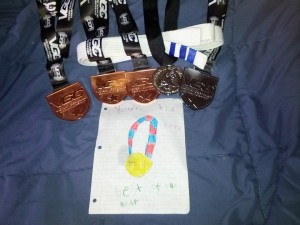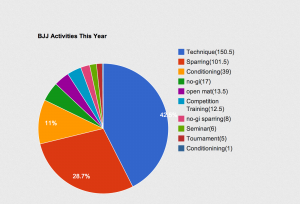For the past few months, my BJJ schedule has been relatively the same:
Monday:
6-6:30 fight fit (conditioning)
11:30-12:30 No-gi technique
5:30 – 6:30 Technique
6:30-7:30 Sparring
Tuesday
5:30 – 6:30 Technique
6:30-7:30 Sparring
Wednesday
6-6:30 fight fit
Thursday
11:30-12:30 No-gi sparring
Friday
6-6:30 fight fit
4:30-6pm Open mat
That comes out to about 9 hours of time at the gym, with 7.5 of that being BJJ. I’m not always able to do this schedule, for example, last week, I hurt my back a bit on Tuesday and didn’t go back to the gym until Monday of this week. This week, some classes were cancelled due to the snowmageddon. However, last year, I ended up with about 360 hours for the year.
I’ve done roughly the same number of hours for the past year. Although, the individual class times have changed, and open mat only started back in August. So there have been some changes that have come up here and there, but by and large, I’ve been getting about 7 hours a week of training.
During this time, I’ve had several people ask me how I do it. How I’m able to put in that amount of time, especially since I’m not a young kid anymore. I was thinking about it tonight and I realized a few things. First of all, I’m not doing anything that extraordinary. It’s 7-9 hours a week. There are countless people doing BJJ across the country that are doing BJJ that often.
Second of all, I think the way that I am able to “do this” is consistency. It’s something I enjoy, why wouldn’t I want to work at it? I realize that I’m not the best at BJJ, I’m not a prodigy. I’m not someone that can just see a move and instantly pull it off. So, if I want to be good at this, if I want to win matches at a tournament, if I want to win gold, then I’m going to have to work on it. So, in that sense, it isn’t really a labor, or maybe it’s a labor of love. I have a focus, I want to get better, so I’m going to have to work to get there.
Thirdly, it’s a lot easier than it appears from the “outside.” Most of us work 40 hours a week, but nobody ever asks “How can you work 40 hours a week? How do you do it?” I actually liken it to my time in seminary. When I started seminary, our two kids were 2 and 4 months. Even when we left, they were 5 and 3. So I had 2 young kids. I was working on a Masters of Divinity which involved quite a bit of reading and paper writing. I took between 12-15 hours each semester. I also worked 30 hours a week. The last semester I was there, I had to pick up about 10 hours of hands on ministry. That’s a lot of time involved, with a family at home. I had several friends that either weren’t married or were newly married, a lot of them asked me how I did it. How did I go to seminary, essentially work full time and have kids. What I told them was, it’s not like I woke up one day and had a wife and two kids. First, I got married, then we had one kid, then a couple years later had another kid.
My BJJ schedule is like that as well. For the first few months I went to 2 technique classes a week. Then I started adding a third one (Saturday morning.) Then I started adding 2 more technique classes. So I went for about 5 hours a week on Monday, Wednesday and Saturday. Then after doing that for about a month, I started going to sparring class twice a week, which made about 7 hours. At that point, I was going to class Monday, Tuesday, Wednesday, Thursday and Saturday. Occasionally, I’d go to a competition class that we’d have on Sundays. Then after a few more months, I added Fight Fit. So it’s not as if I started BJJ one day, and the next day I was doing 9 hours a week at the gym.
Basically, it comes down to this. I added classes at a slow interval, but I never felt comfortable. I was always pushing myself. When I felt like I wasn’t pushing myself as much, I’d add another class. That’s how I do it.
There is absolutely nothing special about what I do, or how I do it.



